Directed by Charukesh Sekar, Telugu film Ammu is a very realistic approach towards narrating the life of a woman who got trapped in a relationship, finding it uneasy to accept that her relationship is toxic and struggling hard to come out of it. Whereas Jaya Jaya Jaya Jaya Hey is a Malayalam film directed by Vipin Das, shows domestic abuse and its upshots through a sarcastic and ridiculous lens—maybe a better way to convince the audience largely, about the matter and its relevance, yet it fails to show how real life looks like.
Ammu and her inner conflicts
Ammu begins with a beautiful and happy Aishwarya Lekshmi who believes in the idea of a husband full of love and passion— and where all the love in the world can be found. The movie and life goes smooth until one day Ammu forgets to drop lunch for her husband Ravi— enacted by Naveen Chandra. His silence disturbs her. On that night, a roaring Ravi is seen, asking Ammu whether she can’t survive a day without sex, when Ammu tries to hug and kiss him on bed. This erupts conflict and panic in Ammu which is beautifully expressed by Aishwarya in the film.
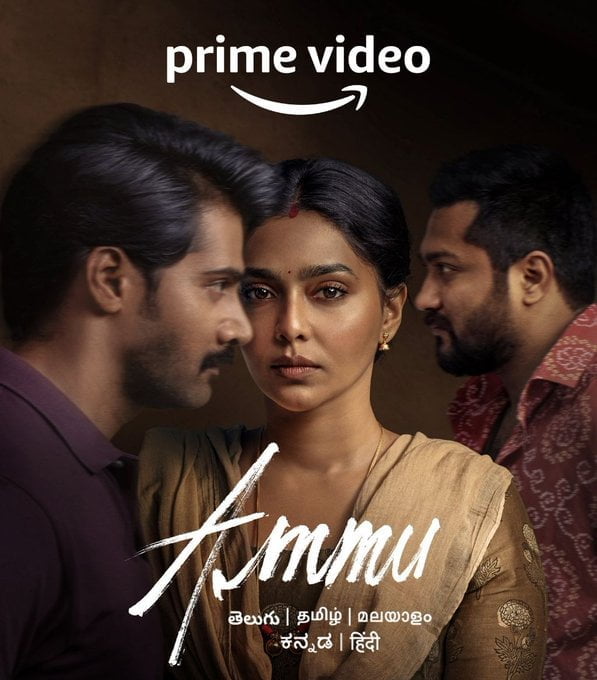
Ravi begins to show his true self to Ammu—full of doubts, ego, and manipulation—by every passing day and this brings discomfort and regret to her, making her realise that marriage is not a promise. Compared to the usual cliché scenes and dialogues, Ammu brings a lot of discourse which is less seen in Indian cinema. In a scene with her mother—wonderfully performed by Maala Parvathi, she reveals about the physical violence that she has been enduring to which we can see, maybe one of the few times in South Indian cinema, a mother asks her daughter to leave the relationship if she can’t take it anymore. This scene gives chills to the audience since this is not a usual phenomenon in India, especially in South India. Mother and Daughter holding hands with each other, trying to bring comfort and the feeling of being safe in their relationship is quite soothing to the eyes of the audience.
Ammu’s idea of a relationship being a sacrifice slowly changes with time and she starts reflecting back to fight Ravi’s ego, masculine pride and toxicity. Ammu, painstakingly fights back against her beloved human being in the world, realising it’s a toxic relationship and there is a need to end that with a note of revenge which completes the second half of the film.
Ammu’s idea of a relationship being a sacrifice slowly changes with time and she starts reflecting back to fight his ego, masculine pride and toxicity. Ammu, painstakingly fights back against her beloved human being in the world, realising it’s a toxic relationship and there is a need to end that with a note of revenge which completes the second half of the film. Indeed, a soft-spoken, vulnerable Ammu transitions herself into a fierce and bold woman who takes courage to come out of an exhausting relationship.
Also read: From Veruthe Oru Bharya To The Great Indian Kitchen: Female Identity In The Domestic Space
Jaya and her fierceness
Jaya Jaya Jaya Jaya Hey narrates the story of a woman called Jaya—the title character. Born and brought up in a lower middle class family in Kerala, Jaya was raised by her father, mother and an elder brother. In the first ten minutes of the film, we are introduced to the growing stage of Jaya where her father proudly says that he will raise her just like how Nehru raised Indira Gandhi—as bold and fearless, to which one of her uncle replies, to make sure that she has hair or else nobody will dare to marry her. This conversation strikes hard to the plot of the film where Jaya— exuberantly portrayed by Darshana Rajendran, is shown as a victim of patriarchy, where her life decisions, from what to wear to whom to marry is upon the shoulders of the men in her family.
Ammu and Jaya give a strong message to the viewers, making them understand that a woman’s body and her choice is nobody’s business and no one has the right to violate it. This is unusual in South Indian movies, where pregnancy is often the man’s choice— which is again normalised through marital rape and sexual abuse.
Jaya’s marriage with Rajesh, performed by Basil Joseph, takes an interesting turn in the story, where Rajesh is depicted as a male chauvinist who believes that women have nothing to do in life other than being pregnant. This brings a conflict between the two where Rajesh eventually conveys his thoughts through actions ending up in slapping Jaya on her face. This has been shown in a sarcastic way where Jaya gets assaulted multiple times followed by Rajesh taking her out for films and food. In the second half of the film, Jaya makes up her mind, learns a martial art to defend him and practices day and night so that she can stop him whenever he tries to cross her boundaries. This might have given the audience an unrealistic or far from reality depiction of how to fight intimate partner violence or domestic abuse.
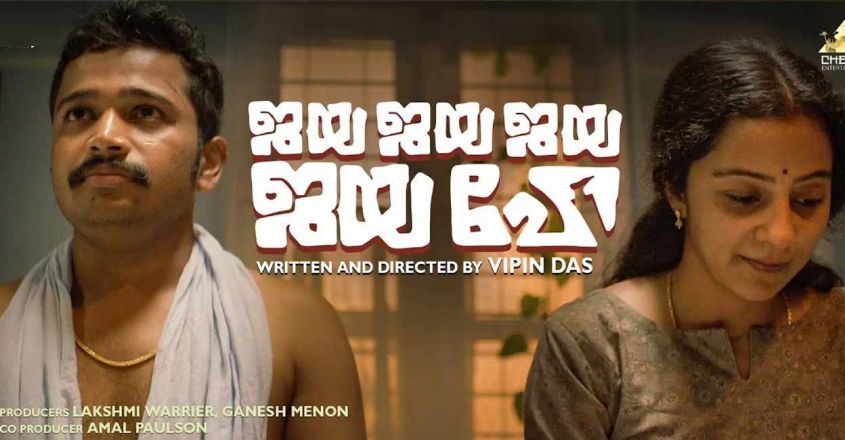
Though there is no homogenous way to tackle domestic abuse and Jaya has been informing her parents multiple times on physical violence that she had to encounter from Rajesh, yet there were cold responses— advices were to be submissive, tolerant, compassionate and normalise the abuse that she had to go through, which is very typical of the Indian households and brings no wonder. Jaya’s sheer faith and consistency helps her to fight against him physically— which might sound a little hilarious and far away from reality. The movie ends with a positive note on re-affirming faith that no woman needs to tolerate these kinds of behaviours.
Jaya Jaya Jaya Jaya Hey is an attempt through humour and sarcasm, which is equally successful in making the Malayalee audience understand the basic things of a relationship—from emotional to financial independence, yet it juxtaposes the idea of a woman’s choice making an irrelevant joke about niqāb— where a Muslim woman is shown talking about freedom while wearing a niqāb, which doesn’t bring laughter anymore, especially in India.
Indian courts have always played a big role in family dramas and Jaya Jaya Jaya Jaya Hey is no different. The concluding scene is from a courtroom where the Judge, enacted by Manju Pillai, mocks at Rajesh realising the reason behind filing the divorce.The film restores faith in society and tries to make us understand how domestic abuse and intimate partner violence shouldn’t be normalised.
Also read: Gender & The Shaping Of New Sensibilities In Malayalam Cinema
Ammu, Jaya and pregnancy
Pregnancy is one of the major plots in both the films where it is shown as the choice of a man, and not the one who’s conceiving. This has been dealt with seriousness by giving hints to the audience on how pregnancy often brings misery and chaos in life when it’s not the choice of the woman.
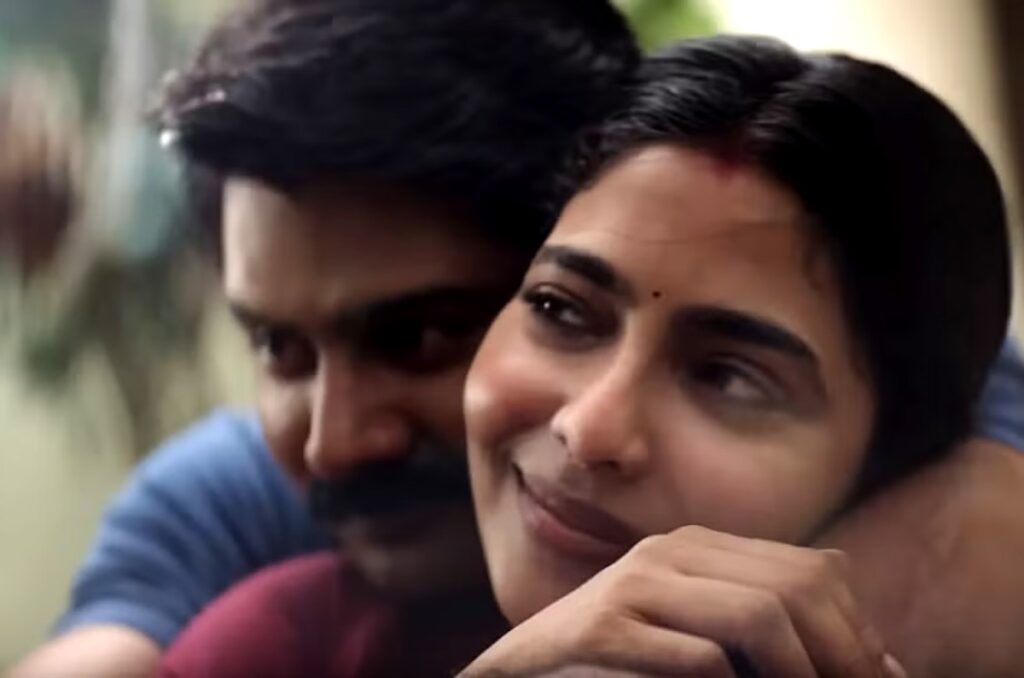
While Ammu pleads to the doctor asking not to reveal that she is pregnant to Ravi, Jaya had no choice but to realise that it was Rajesh’s plan to trap her in their marital relationship, which startled her and ends up in an abortion. Both Ammu and Jaya give a strong message to the viewers, making them understand that a woman’s body and her choice is nobody’s business and no one has the right to violate it. This is unusual in South Indian movies, where pregnancy is often the man’s choice— which is again normalised through marital rape and sexual abuse.
Women in South Indian cinema and intimate partner violence
The South Indian film industry has never been bold enough to explicitly call out domestic abuse and intimate partner violence. This can be due to the belief system created in the society that such films can never be a sensational hit, especially in Kerala. With the release of The Great Indian Kitchen in recent times, there has been much receptivity among the viewers asking for more films that have social and political relevance. The discussions on Ammu and Jaya Jaya Jaya Jaya Hey in social media and everywhere else can be considered as a reflection of this reception.
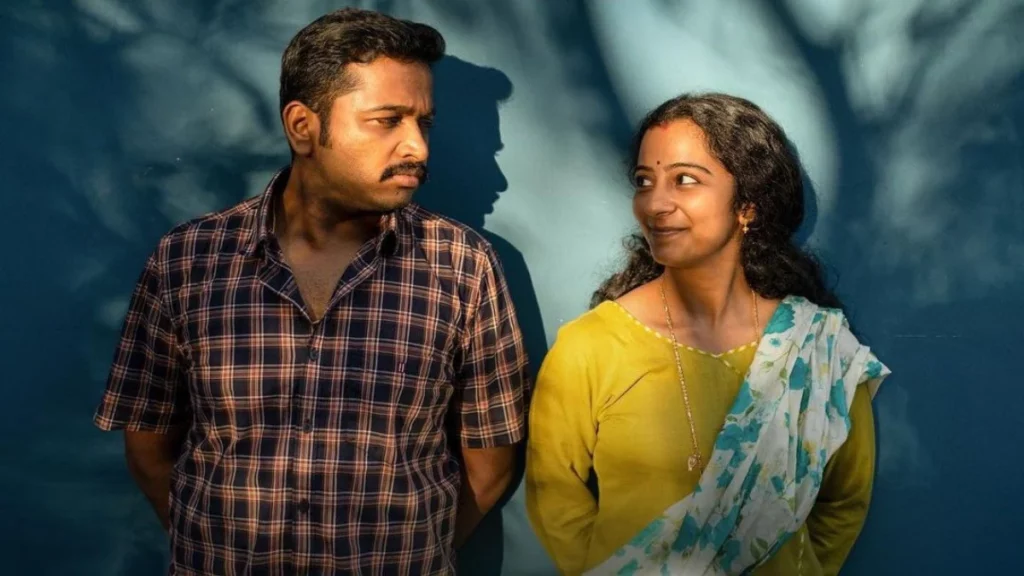
The Malayalam and Telugu film industries are quite popular for glorifying intimate partner violence and male chauvinist perspectives for decades— Arjun Reddy that created history in the box office is just another random proof of how the society still believes that intimate partner violence is another form of true love.
Also read: How Have Women Been Portrayed In Telugu Cinema
Ammu has been successful in rewriting that history with the sheer elegance of Aishwarya Lekshmi who’s trembling face and vulnerable heart impresses the audience and encourages them to come out of a toxic relationship even if it is the only refuge for them. Jaya Jaya Jaya Jaya Hey is an attempt through humour and sarcasm, which is equally successful in making the Malayalee audience understand the basic things of a relationship—from emotional to financial independence, yet it juxtaposes the idea of a woman’s choice making an irrelevant scene and a senseless joke about niqāb— where a Muslim woman is shown talking about freedom while wearing a niqāb, which doesn’t bring laughter anymore, especially in India.
About the author(s)
Rohini did her Masters in English from Jamia Millia Islamia, New Delhi. Beyond her passion for music, she writes about performing arts in socio-cultural contexts. An ardent fan of Sylvia Plath and Kamala Suraiyya, she believes poetry has the power to heal.
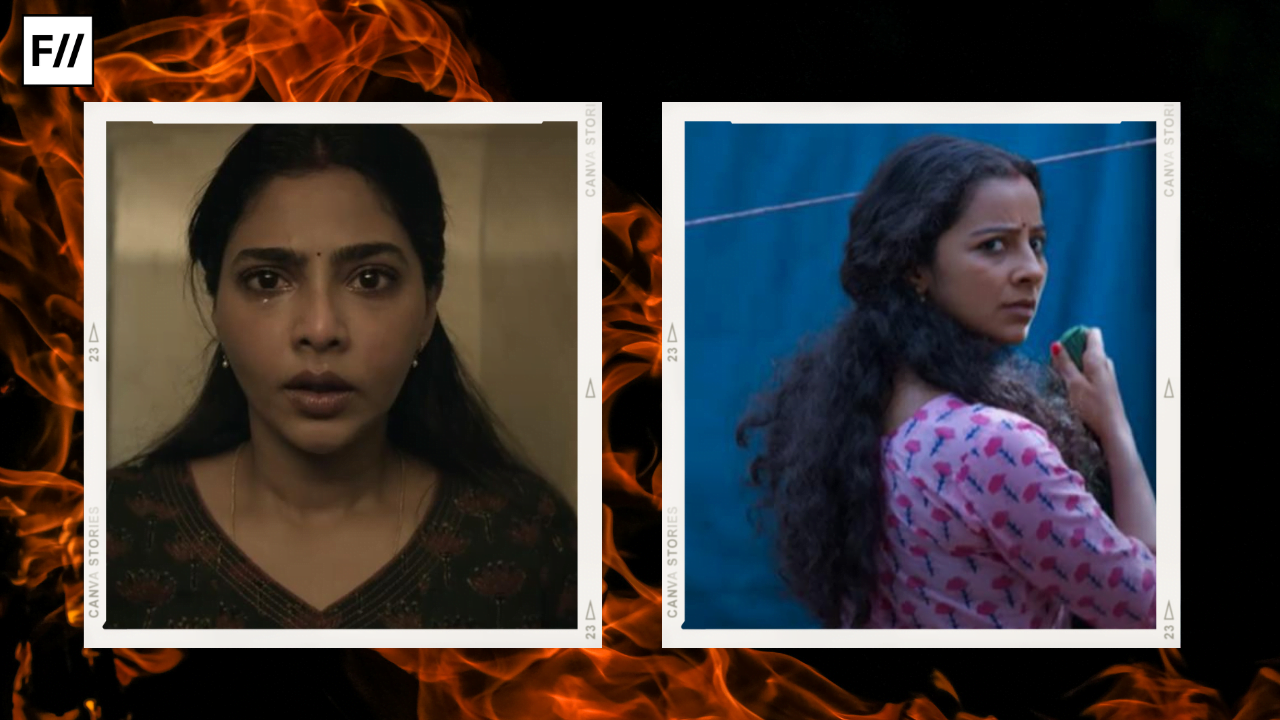




Ammu against Jaya – a thorough in depth analysis. Lucid and comprehensive!